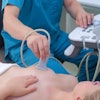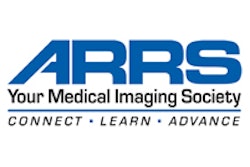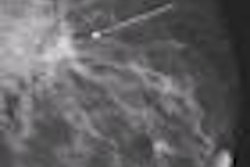Short-term follow-up is an appropriate alternative to biopsy of palpable breast lesions with benign imaging features, according to a new study published in the December issue of the American Journal of Roentgenology.
Researchers from the University of Virginia in Charlottesville, VA, evaluated whether this kind of disease management was feasible, particularly for young women with probable fibroadenoma. According to lead author Dr. Jennifer Harvey and colleagues, it's fine to wait (AJR, December 2009, Vol. 193:6, pp. 1723-1730).
"I was motivated to perform the study because there are so many women that present with a palpable mass that is almost surely a fibroadenoma, and the likelihood of cancer is very small," Harvey told AuntMinnie.com.
Harvey's team identified all women with round, oval, or lobular palpable masses for whom short-term follow-up had been recommended between July 1997 and December 2003. The study included 320 women (mean age, 34 years) with 375 palpable masses. The women's eventual disease outcomes were tracked with imaging or with clinical follow-up for at least 12 months.
Of all the lesions, 186 (49.6%) were evaluated with mammography and ultrasound and 189 (50.4%) were evaluated with ultrasound alone. Of the 189 women who underwent ultrasound only, 151 were 30 years old or younger and 20 were 31 to 35 years old.
"Lesions were most frequently thought to be probable fibroadenoma or complicated cyst as opposed to a solid mass," Harvey and colleagues wrote. "Specifically, 304 masses (81.1%) in 262 women were reported as probable fibroadenoma. Women with probable fibroadenoma ... were younger than women with a complicated cyst as opposed to a solid mass."
Eighty-five lesions were biopsied after evaluation, and one 1.5-mm ductal carcinoma in situ was diagnosed; at follow-up (mean, 2.7 years), 26 lesions had grown. Of these, 24 were biopsied and no cancer was found.
The study showed an acceptably low prevalence of breast cancer (0.3%) in these palpable breast lesions with benign features, so low that short-term follow-up is a reasonable alternative to biopsy, the authors wrote. And in this era of intense scrutiny of healthcare costs, the cost to Medicare of imaging follow-up is lower than that of immediate biopsy, at $410 versus $789, even when subsequent biopsy due to interval growth is taken into account.
Cost comparison between follow-up imaging and
immediate biopsy
|
||||||||||||||||||||||||||||||||||
| *Women ages 40 and older are assumed to undergo bilateral mammography as part of ongoing clinical
care. Table courtesy of the American Roentgen Ray Society. |
||||||||||||||||||||||||||||||||||
But what's clinically reasonable may not always appeal to patients, according to Harvey: Even though the rate of cancer is low in this clinical situation, patients may request biopsy for peace of mind.
"Some patients may desire biopsy of a palpable finding because of anxiety," the group wrote. "The presence of a palpable lump can cause more anxiety than a nonpalpable finding does."
By Kate Madden Yee
AuntMinnie.com staff writer
December 7, 2009
Related Reading
U.S. Senate boosts preventive care for women, December 3, 2009
U.S. debate over mammograms splits along party lines, December 3, 2009
Panel of radiologists rejects USPSTF mammogram guidelines, December 2, 2009
Controversy can't alter facts: Screening mammography has proven benefits, December 2, 2009
ACR: Don't add USPSTF guidance to reform, November 24, 2009
Copyright © 2009 AuntMinnie.com




















